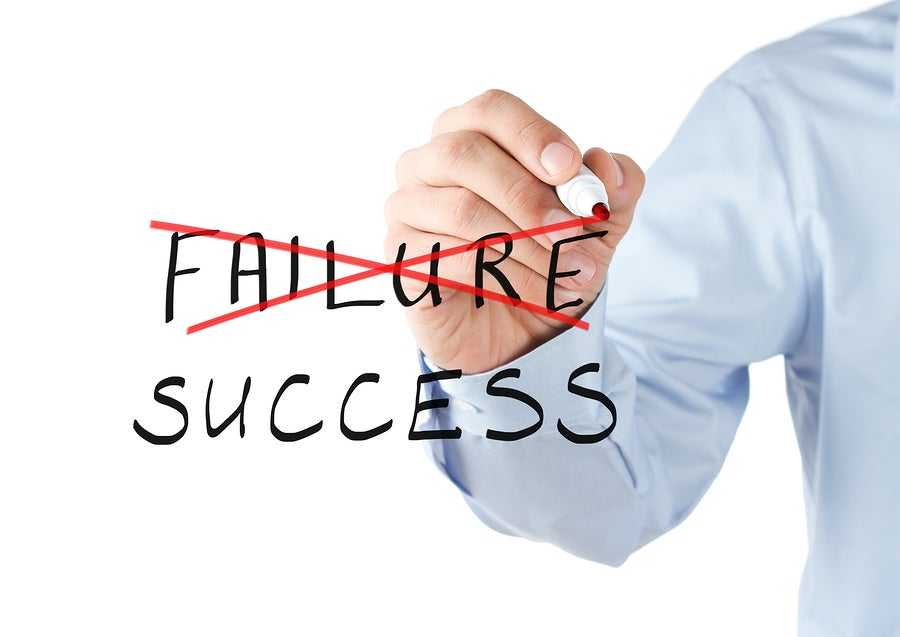Those aspiring to become Scrum Masters or product owners need to obtain a Scrum certification to increase their chances of landing a Scrum leadership role. Not only does it show employers the willingness to go the extra mile to learn about Scrum principles, but it also makes good financial sense. For instance, individuals who pursue the certified Scrum Masters certification earn up to 40% higher salaries than non-certified Scrum Masters.
What is a Scrum Certification?
A Scrum certification is a credential that validates and expands Scrum professionals’ skills in and knowledge of Scrum as an Agile project management framework. This guide covers top Scrum certifications to kickstart a career as a project manager and a Scrum Master.
Top Scrum Certifications
| Certification | Certifying Body | Price in USD | Focus | Experience Level | Renewal Interval | Renewal Fee in USD |
|---|---|---|---|---|---|---|
| CSM | Scrum Alliance | 399+ | foundational knowledge | entry-level | every 2 yrs | 100 |
| A-CSM | Scrum Alliance | 780+ | application of foundational knowledge | intermediate | every 2 yrs | 175 |
| CSP-SM | Scrum Alliance | 1125+ | improved Scrum application | advanced | every 2 yrs | 250 |
| DASM | PMI | 399-499 | Scrum, Agile, and Lean basics | entry-level | every year | 50 |
| DASSM | PMI | 749 | Advanced agile application | intermediate | every year | 50 |
| PSM I | Scrum.org | 150 | fundamental Scrum knowledge | entry-level | N/A | N/A |
| PSM II | Scrum.org | 250 | role and responsibilities of Scrum Master | intermediate | N/A | N/A |
| PSM III | Scrum.org | 500 | Scrum leadership, mentoring | advanced | N/A | N/A |
| SAFe SSM | Scaled Agile | 600 | Intro to and application of SAFe principles | entry-level to intermediate | every year | 100 |
| SAFe SASM | Scaled Agile | 525 | Scrum Master leadership | advanced | every year | 100 |
| RSM | Scrum Inc. | 1995 | Understanding role of Scrum Master | any level | every year | 25+ |
Certified ScrumMaster
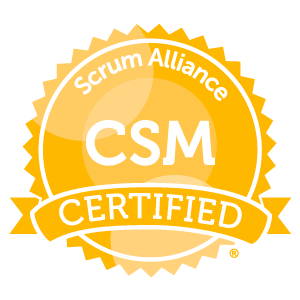
Scrum Alliance’s Certified ScrumMaster (CSM) certification is designed for entry-level professionals who want to become familiar with Scrum as a part of the Agile framework and eventually lead others in following Scrum, values, principles, and practices.
In this program, individuals gain a solid understanding of Scrum and learn practical ways to apply it in the workplace before taking the CSM exam. They learn Scrum theory and how to plan sprints.
Each step of the CSM certification process is guided by knowledgeable, experienced Agile trainers, and each CSM class can be tailored to meet student needs.
This certification starts at $399 and includes the course and exam. It must be renewed every two years for a fee of $100.
Prerequisites
There are no prerequisites for this certification, making it a great fit for beginners.
CSM exam
The exam is 60 minutes long with 50 questions. Individuals must answer at least 37 of them correctly to pass.
How to prepare
Learners enroll in an instructor-led online or in-person course and take the exam at the end. Courses last two to three days for a total of 15-17 hours.
Courses are offered through several different providers around the world, so fees will vary.
After earning the CSM, Scrum Alliance provides several more certifications that allow further specialization, such as the Advanced Scrum Master Certification.
Advanced ScrumMaster Certification
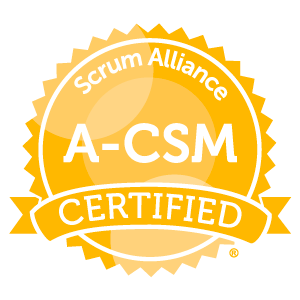
Scrum Alliance offers the Advanced ScrumMaster certification (A-CSM) for those who have earned the CSM and want to learn how to apply foundational knowledge about Scrum in their workplace.
The A-CSM certification teaches how to:
- Facilitate effective dialogue among the Owner, Scrum Team members, and relevant stakeholders
- Manage conflict
- Lead and motivate others in the Scrum Team
- Scale Scrum and Agile from one to several teams within an organization
The A-CSM costs $780 and up and is valid for two years at which point a renewal fee of $175 is due.
Prerequisites
Suitable for intermediate Scrum Masters. Individuals must possess a valid CSM certification to earn the A-CSM and have at least one year of Scrum Master work experience.
A-CSM exam
The A-CSM does not require an exam, only a course.
How to prepare
Learners enroll in an instructor-led online or in-person course. Preparation for the A-CSM is more flexible compared to the CSM, as there are both live, synchronous sessions and self-paced, asynchronous sessions. Courses last one to two days for a total of about 16 hours.
Courses are offered through several different providers around the world, so fees will vary.
Certified Scrum Professional ScrumMaster Certification
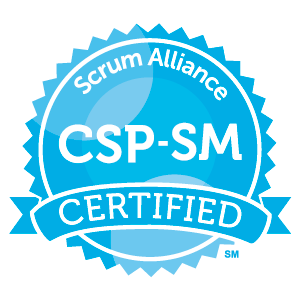
The CSP-SM certification from Scrum Alliance validates one’s expertise in Scrum and Agile principles and is best studied for advanced Scrum Masters.
The CSP-SM costs $1125 and up and is valid for two years at which point a renewal fee of $250 is due.
Prerequisites
Those wishing to acquire the CSP-SM certification must hold a valid A-CSM and have at least two years of work experience as a ScrumMaster.
CSP-SM exam
The CSP-SM does not require an exam, only a course.
How to prepare
Learners enroll in an instructor-led online or in-person course. Scrum Alliance offers both live, synchronous sessions and self-paced, asynchronous sessions. Courses last one to two days for a total of about 16 hours.
Courses are offered through several different providers around the world, so fees will vary.
Disciplined Agile Scrum Master
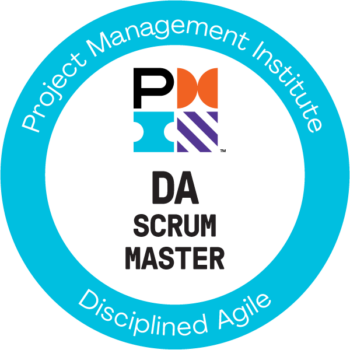
Project Management Institute (PMI) offers several Scrum certifications, such as the Disciplined Agile Scrum Master (DASM) certification. Through this certification, one learns the fundamentals of Scrum, Agile, and Lean frameworks.
By earning this certification, one will be able to effectively lead agile teams and apply Agile principles to your workplace.
The course, including the exam, costs $399 for PMI members and $499 for non-members.
Prerequisites
No prior knowledge of or experience with Agile or Scrum is required.
DASM exam
The online exam consists of 50 multiple-choice questions to be answered within two hours. The exam must be taken within 60 days of receiving the invitation.
How to prepare
PMI offers a variety of self-paced online and in-person courses to fit your preferences. The DASM course is made up of nine modules that take a total of 14 hours. Upon completing the course, learners receive an invitation to take the online exam described above.
Disciplined Agile Senior Scrum Master
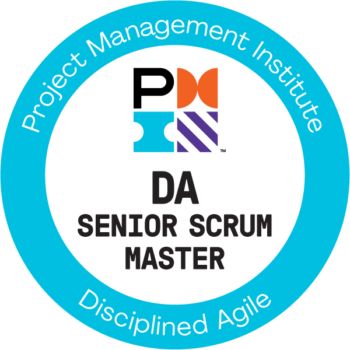
PMI’s DASSM certification provides a deeper understanding of how to apply the Disciplined Agile toolkit to solve advanced problems and how to effectively lead Agile teams.
The cost of the course, including the exam, will vary by provider, but the lowest we found was $749.
Prerequisites
Before obtaining the DASSM, one must:
- Have at least two years of work experience in an agile team
- Possess a solid understanding of the Disciplined Agile tool kit, usually via DASM certification
DASSM exam
The DASSM is administered online and contains 50 multiple-choice questions to be answered within two hours. The exam must be taken within 60 days of receiving the invitation.
How to prepare
The DASSM course can be taken online at one’s own pace or over the course of two days in an instructor-led, in-person workshop.
The course is made up of nine modules that take a total of 14 hours. Upon completing the course, learners receive an invitation to take the online exam described above.
Professional ScrumMaster I
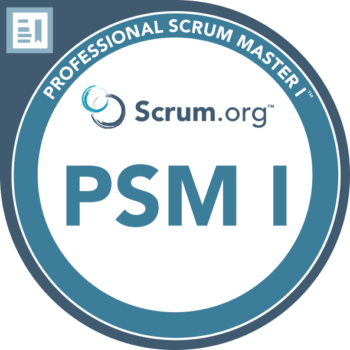
Scrum.org offers three levels of its Professional Scrum Master certification: PSM I, PSM II, and PSM III. In the first level of this series, candidates gain foundational knowledge of Scrum, the Scrum Guide, and how to apply Scrum principles in the workplace.
The PSM I exam on its own costs $150. A prep course will cost an additional fee that varies by provider.
Prerequisites
There are no prerequisites for the PSM I certification, so it’s perfect for beginners.
PSM I exam
Candidates have one hour to answer 80 questions that are in multiple-choice, multiple-answer, and true-false formats. Candidates must receive a score of at least 85% to pass.
How to prepare
Though a course is not required to take the exam, the two-day Applying Professional Scrum or Professional Scrum Master courses are highly recommended.
The Applying Professional Scrum course entails two 16-hour days of live online sessions. Cost differs based on the provider.
The Professional Scrum Master course consists of two five-hour days of live online or in-person sessions. The cost for the course will vary depending on the provider, but the course includes one free attempt at taking the PSM I exam.
Additional resources to help prepare for the exam, include:
- Focus areas defined by the Professional Scrum Competencies
- The Scrum Guide
- PSM I Suggested Reading list
- Additional resources available in the Scrum Master Learning Path
Professional ScrumMaster II
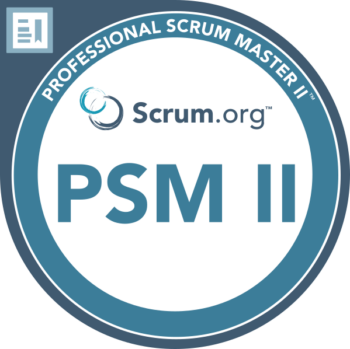
The PSM II certification is the next in Scrum.org’s series that builds on knowledge acquired while studying for the PSM I exam. The PSM II certification focuses on more advanced Scrum knowledge, builds on Scrum work experience, and develops skills to become a better Scrum Master.
The PSM II exam costs $250 on its own, but a prep course will cost an additional fee that depends on the course provider.
Prerequisites
There are no prerequisites to take the PSM II exam, but it’s recommended to do one or more of the following:
- Earn the PSM I certification
- Take the Professional Scrum Master course
- Enroll in the PSM II training course
Doing at least one of these beforehand provides a solid knowledge base and increases the chance of success in the PSM II exam.
PSM II exam
Candidates have 90 minutes to complete 30 questions that are in multiple-choice, multiple-answer, and true-false formats. Candidates must receive a score of at least 85% to pass.
How to prepare
It’s not required to take a course, but it’s recommended to take the PSM II training course which spans five days and takes three and a half hours per day. Course sessions are available in-person or live online, and the fee varies by provider.
Additional resources to help prepare for the exam include:
- Focus areas defined by the Professional Scrum Competencies
- The PSM II Suggested Reading list
- The Scrum Master learning path contains more resources to consult
- Owner, Agile Leader, and Development Team Member learning paths
Professional ScrumMaster III
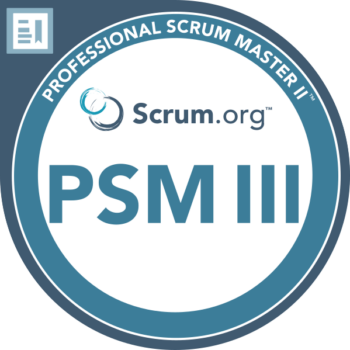
The third and final certification in Scrum.org’s series is the PSM III certification which concentrates on deep, expert-level application of Scrum, Scrum practices, and Scrum values in a wide range of contexts. Those who earn a PSM III certification demonstrate that they are well-positioned to train and mentor others in Scrum.
The PSM II exam costs $500 on its own, but a prep course will cost an additional fee that can vary depending on the provider.
Prerequisites
While there are no prerequisites for the PSM III exam, the Professional Scrum Foundations or Professional Scrum Master are recommended for a refresher on previously acquired knowledge.
PSM III exam
Candidates lean on their knowledge and applied experience to complete this exam. The exam is 150 minutes in length and contains 30 questions that are in multiple-choice or short-answer formats. Candidates must receive a score of at least 85% to pass.
How to prepare
It’s not required to take a course, but it’s recommended to take the Professional Scrum Master and/or PSM II training courses.
Scrum Alliance and Scrum.org certification offerings are comparable, but Scrum.org is more cost effective and more flexible in the sense that a prep course is not required. The learner is therefore more in control of their own learning process when pursuing a Scrum.org certification as opposed to one from Scrum Alliance. However, Scrum Alliance certifications encourage continued education to keep certifications current every two years.
SAFe Scrum Master
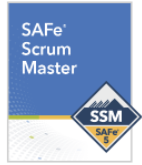
Scaled Agile’s SAFe Scrum Master (SSM) certification teaches individuals:
- Iteration planning
- Standups
- Retrospectives
- Implementation of workflows and continuous delivery in DevOps environment
- Agile team management
- How to apply the Scaled Agile Framework (SAFe)
SAFe is one of the leading frameworks for scaling Agile, Lean, and DevOps practices in an organization.
The SAFe Scrum Master certification focuses on the fundamentals of Scrum and how to build and manage Agile teams.
The course fees depend on the provider but generally start at $600 and include the exam fee.
Prerequisites
There are no prerequisites to acquire the SAFe Scrum Master certification. However, candidates should have working knowledge of Agile, Scrum, Kanban, Extreme Programming, and DevOps processes.
SSM exam
Candidates have 90 minute to answer 45 multiple-choice/multiple-answer questions and must obtain a passing score of at least 75%. The exam is administered online and covers the following areas:
- Introducing Scrum in SAFe
- The role of the Scrum Master
- Experience program increment (PI) planning
- Facilitating iteration execution
- Finishing the PI
How to prepare
Those who wish to obtain this certification must enroll in a two-day live online course whose cost will vary depending on the provider.
SAFe allows certification holders to renew after one year for a fee. Those who want to recertify do not have to retake the exam.
SAFe Advanced Scrum Master
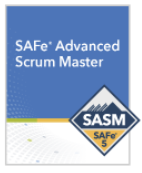
SAFe’s SASM certification teaches experienced Scrum Masters how to:
- Manage successful Agile Teams
- Apply Lean, Kanban, DevOps, and SAFe principles to improve outcomes
- Coach multiple on-site or distributed teams
- Adopt scalable engineering practices
- Facilitate successful Agile Release Trains (ARTs)
Cost will depend on the provider; expect to pay $525 or more. Course fees include the exam.
Prerequisites
There are no prerequisites to acquire the SAFe Advanced Scrum Master certification. However, it’s highly recommended that candidates have the SSM, CSM, or PSM certification before taking the SASM certification exam.
SASM exam
The online exam is made up of 60 multiple-choice or multiple-answer questions to be answered within two hours. Candidates must earn a passing score of at least 73%.
The exam is administered online and covers the following areas:
- The Scrum Master role
- SAFe principles and their application
- Agile and Scrum anti-patterns
- Program execution
- Kanban and extreme programming (XP)
- Building and leading high performing teams
- Improving program performance
How to prepare
Those who wish to obtain this certification must enroll in a two-day live online course whose cost will vary depending on the provider.
SAFe allows certification holders to renew after one year for a fee. Those who want to recertify do not have to retake the exam.
Registered Scrum Master Certification
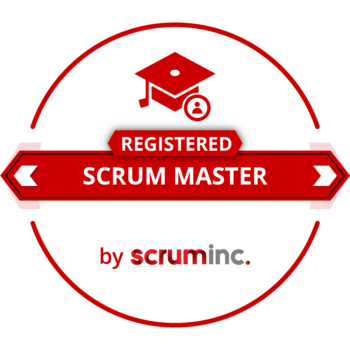
Scrum Inc. also offers an action-packed Registered Scrum Master (RSM) certification. Aside from traditional lecture formats, course participants are placed in teams and take part in games and other activities to:
- Create a product backlog
- Prioritize the product backlog
- Manage a burndown chart
- Simulate the Scrum Master role
Each course costs $1,995 and includes the exam fee. Certifications must be renewed annually for a fee of either $25 of $50. The renewal fee is dependent upon the GDP per capita of the certification holder’s legal place of residence.
Prerequisites
There are no prerequisites to taking part in the RSM certification program; it’s suitable for all levels of experience.
RSM exam
The RSM exam consists of 30 questions that are a combination of multiple-choice and true/false questions. Candidates have 60 minutes to complete the exam which tests knowledge of the following areas:
- General Scrum knowledge
- Scrum roles
- Scrum meetings
- Scrum artifacts
A passing score is 75%. The exam must be taken within 30 days of attending the course.
How to prepare
To earn the certification, enroll in the two-day virtual live course that runs for a total of 16 hours. At the end, learners take the RSM exam. All of the topics on the exam will be covered during class. Candidates must complete all course sessions and miss no more than two hours of class to receive a credential.
Upon successful completion of both the course and the exam, candidates receive their RSM certification.
The RSM is great for aspiring Scrum Masters who want to understand how Scrum impacts an organization on a macro level.
Which Scrum Certification is Right For You?
To become an effective Scrum Master, a certification is essential to finding success in this career path. A number of reputable certifying bodies offer Scrum certification programs that meet a variety of price points, target specific experience levels, and focus on different areas of Scrum.
Consider cost
Scrum.org’s certifications are by far the most cost effective certification program, and they do not require certification. For those who value staying current on their Scrum knowledge, Scrum.org’s certifications are probably not right for your career goals.
Experience level and career trajectory
PMI targets those who are early in their Scrum career but nothing for more advanced Scrum professionals. Scrum Alliance and SAFe offer a series of certifications to guide Scrum professionals from the start of their career until later on, cultivating the next generation of Scrum Master leadership.
No matter your budget, goals, or career stage, there is a certification program that supports your career goals in Scrum.
Read more: Best Scrum Software and Tools for 2022



